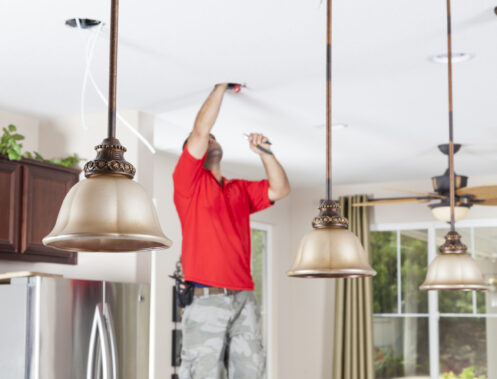
If you’re worried about dimming or flickering lights in your home, you’re not entirely wrong. These issues shouldn’t be taken lightly. The reason for flickering lights could be something as simple as a loose or poorly installed bulb, and that’s something you can easily fix yourself. However, the problem can also be very serious. The problem could be an electrical issue, which can be dangerous. If the latter is the case, the issue needs immediate attention from an electrician. It’s challenging to know when you have a small problem or a major issue. Below are some possible reasons why your home’s lights are dimming or flickering.
Loose or Poorly Installed Bulb
A random or infrequent flicker from a single bulb means that the power supply is inconsistent. This is usually indicative of a bulb that’s loose or poorly installed. In this case, be sure to turn off the switch first and then check your bulb. Try to make sure it’s fastened tightly.
Sometimes, a single light that dims may signify that the bulb has run its course. In this case, all you need to do is replace it with a new light bulb.
Loose Wiring
Electrical wiring that’s loose or worn may be the reason for unsteady lights. So, if flickering increases, it may be time to have your wiring or connectors inspected. This is not a problem you should tackle on your own. Let an experienced electrician handle this for you. Loose wires can be a fire hazard due to arcing and overheating.
Overloaded Circuit
Do you notice your lights flickering whenever you turn on an electrical appliance? The problem may be an overloaded circuit. Most major appliances use a lot of energy whenever they warm up. So, if your lights are flickering at the same time, your circuits may be on the fritz. It may be time to have new ones installed.
Utility Issues
Occasionally, flickering lights may have roots in utility issues. Although this problem isn’t always fatal, it can be a nuisance. Any homes that use the same transformer could be using greater loads of electricity than you. This is a common concern because most homes are requiring more power for electronic devices such as computers and flat-screen TVs. Contact an electrician if the problem persists.
Inconsistent Voltage
The average expected electrical voltage for most homes ranges from 115 to 125 volts. This is because most homes are equipped with a 120-volt circuit, which is good for handling such loads. Any voltmeter reading over 125 volts means there’s trouble. You may have an electrical fault, which can cause your lights to flicker. Furthermore, you may experience bulbs burning out a lot quicker than is normal. If you find that you’re having to replace your light bulbs much quicker than usual, it’s time to have your electrical system checked.
Other signs of bad voltage include:
- Random and inconsistent dimming or flickering of lights
- Malfunctioning appliances or appliances that turn off suddenly
- Lights that still flicker after an appliance is turned off
A decrease in your home’s total wattage could be one of the reasons for flickering lights. Most homes are connected to low-voltage grids, most of which can deliver a maximum amount of 230 volts. Any electrical use that exceeds this amount may cause your lights to flicker or dim.
Electrical Arcing
Arcing happens when electrons flow between two conductors, both of which are usually metal. This reaction happens when there’s a bad connection, during which the electrical current jumps. This is one of the most common causes of electrical fires because each jump exceeds 10,000 degrees Fahrenheit.
The good news is that you can prevent arcing from getting worse. Have an electrician check your fixtures and switches for old or loose wiring. The problem could also lie in your connectors or service conductors. Be sure your breaker box connectors and main panel are up to date.
Sudden Power Surges
If you’ve ever experienced a power outage due to a storm or a downed wire, odds are you may have experienced a power surge. There are other common causes of power surges in your home. Some of the root causes include:
- Electrical overload
- Tripped breakers
- Transformer malfunctions
- Momentary circuit disruptions
Sometimes, you may experience a minor outage that lasts for only a few minutes. Flickering lights as the result of power surges are costly. They can cause a lot of damage to your appliances and electronics. If you believe your light bulbs are flickering on and off because of a surge, call your electrician immediately.
Main Connection Issues
Your main meter box is the very thing that moderates your electricity use. In fact, the main meter is the very device that is responsible for measuring the total amount of electricity you use each month. Because of it, you can get a good idea of how much you owe on electricity every month.
Your main meter is made up of several components, including the main switch, your fuses, and your circuit breakers. All of these components work together to control the ebb and flow of your electricity. In some cases, it may even stop it altogether, and if you’re wondering what this has to do with flickering lights, there are a few things you should know about how the two are connected.
If you happen to notice lights that suddenly flicker in one part of the house, such as a single room, the problem may have something to do with your main meter. Even if the problem only lies in one bulb, this could be it. But if you discover that the flickering is somewhat inconsistent or it occurs throughout your house, it may be time for you to have your meter box inspected. The fault may lie in the wiring or the main service connection.
Old or Incompatible Switches
If you’ve recently made the switch from incandescent bulbs to LED bulbs, you may want to look into an electrical switch upgrade. You’ll need something that works well with LED bulbs.
Loose or faulty wiring in your dimmer switches may be the cause of your flickering lights. If this is the case, your electrician may need to fix or replace old wiring. In other cases, you’ll need to look into having your dimmer switches upgraded to new ones. Make sure you buy dimmer switches that match well with your new bulbs. Look for matching ratings as these can ensure that your bulbs won’t buzz or flicker.
Call the Pros
Electrical problems such as flickering lights can be both a nuisance and a worry. At Liberty Comfort Systems, our experts can help you resolve these electrical issues so that they don’t continue to plague your home in Anoka, MN. We offer electrical repair, installation, and maintenance. We can inspect your electrical system and replace your old wiring as needed. Don’t hesitate; call us today!

